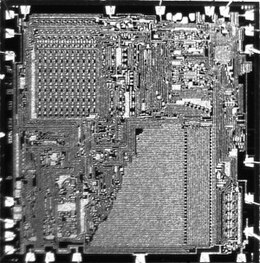History
The advent of low-cost computers on integrated
circuits has transformed modern society. General-purpose microprocessors in personal
computers are used for computation, text editing, multimedia display, and
communication over the Internet. Many more microprocessors are part of embedded
systems, providing digital control over myriad objects from appliances to
automobiles to cellular phones and industrial process control.
 The microprocessor has origins in the development
of the MOSFET (metal-oxide-semiconductor field-effect transistor, or MOS
transistor), which was first demonstrated by Mohamed M. Atalla and Dawon Kahng
of Bell Labs in 1960. Following
the development of MOS integrated circuit chips in the early 1960s, MOS chips
reached higher transistor density and lower manufacturing costs than bipolar integrated
circuits by 1964. MOS chips further increased in complexity at a rate predicted
by Moore's law, leading to large-scale integration (LSI) with hundreds of transistors
on a single MOS chip by the late 1960s. The application of MOS LSI chips to computing
was the basis for the first microprocessors, as engineers began recognizing
that a complete computer processor could be contained on several MOS LSI chips.
The microprocessor has origins in the development
of the MOSFET (metal-oxide-semiconductor field-effect transistor, or MOS
transistor), which was first demonstrated by Mohamed M. Atalla and Dawon Kahng
of Bell Labs in 1960. Following
the development of MOS integrated circuit chips in the early 1960s, MOS chips
reached higher transistor density and lower manufacturing costs than bipolar integrated
circuits by 1964. MOS chips further increased in complexity at a rate predicted
by Moore's law, leading to large-scale integration (LSI) with hundreds of transistors
on a single MOS chip by the late 1960s. The application of MOS LSI chips to computing
was the basis for the first microprocessors, as engineers began recognizing
that a complete computer processor could be contained on several MOS LSI chips.  |
| The PICO1/GI250 chip introduced in 1971: It was designed by Pico Electronics (Glenrothes, Scotland) and manufactured by General Instrument of Hicksville NY. |
We will take a look at the five generations of microprocessors that have been developed ever since the first microprocessor came into being.
Comments
Post a Comment